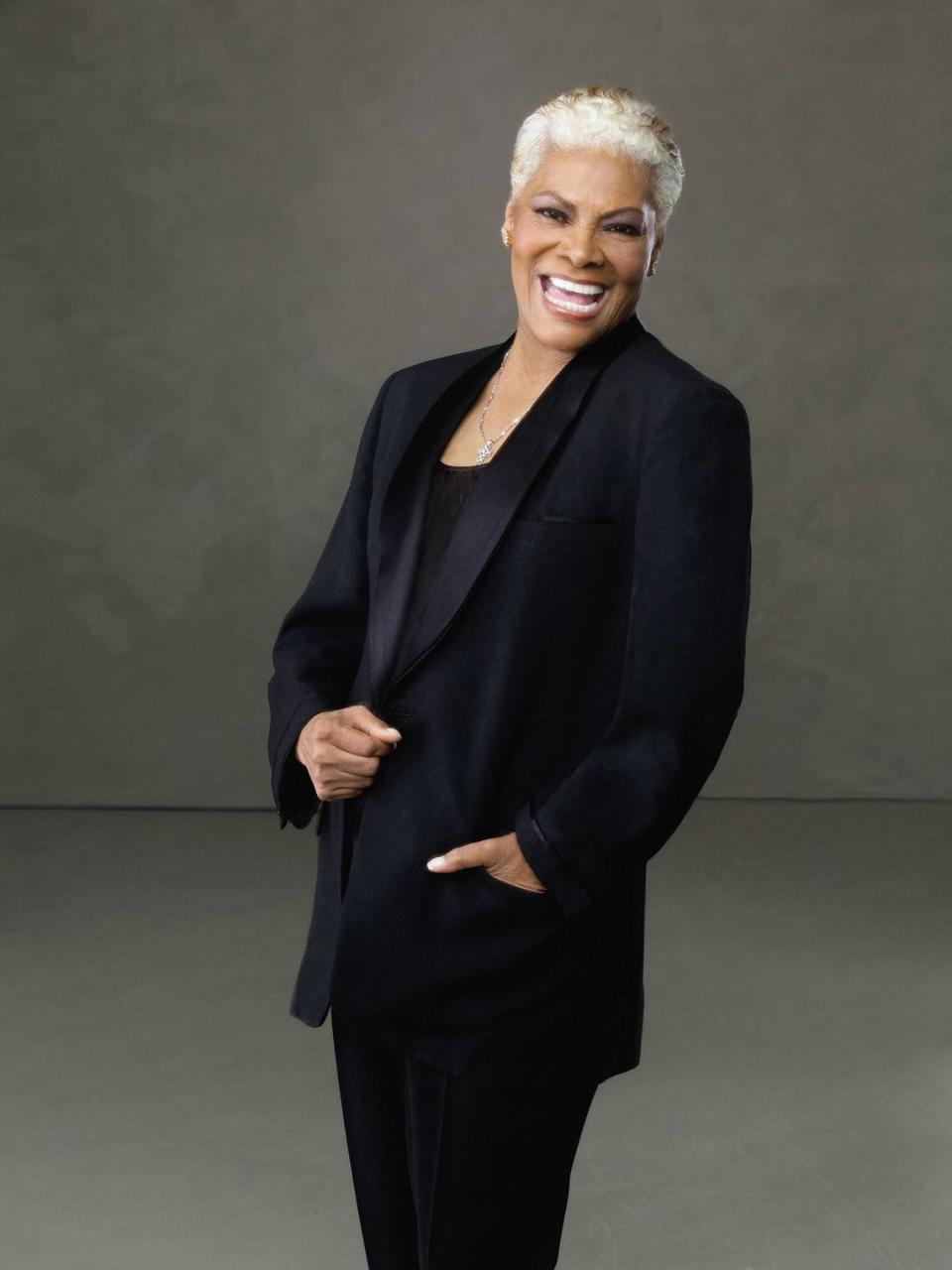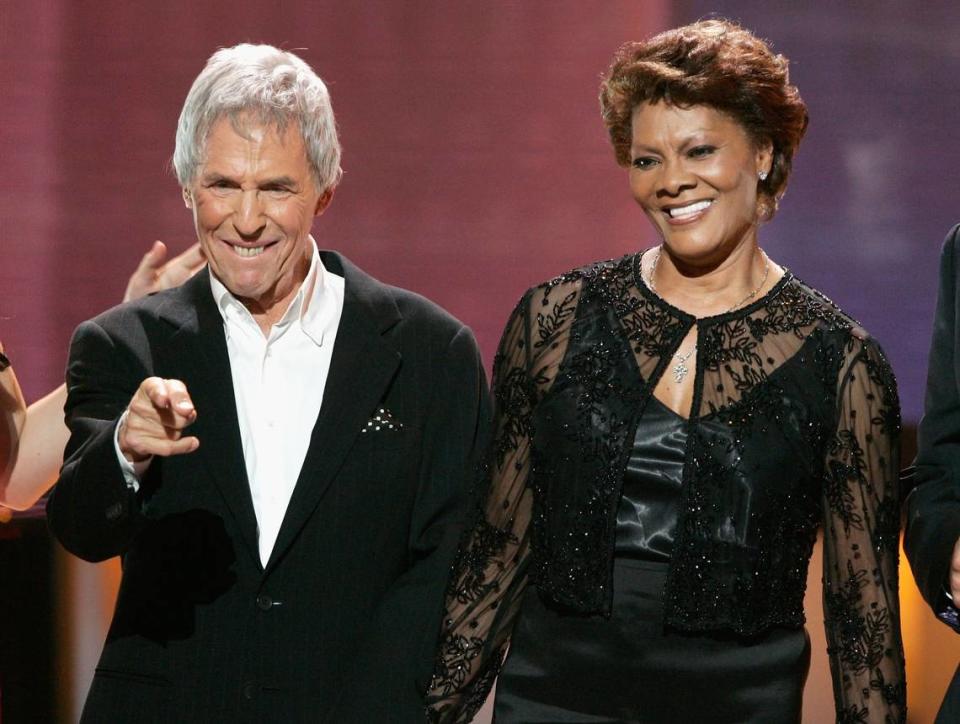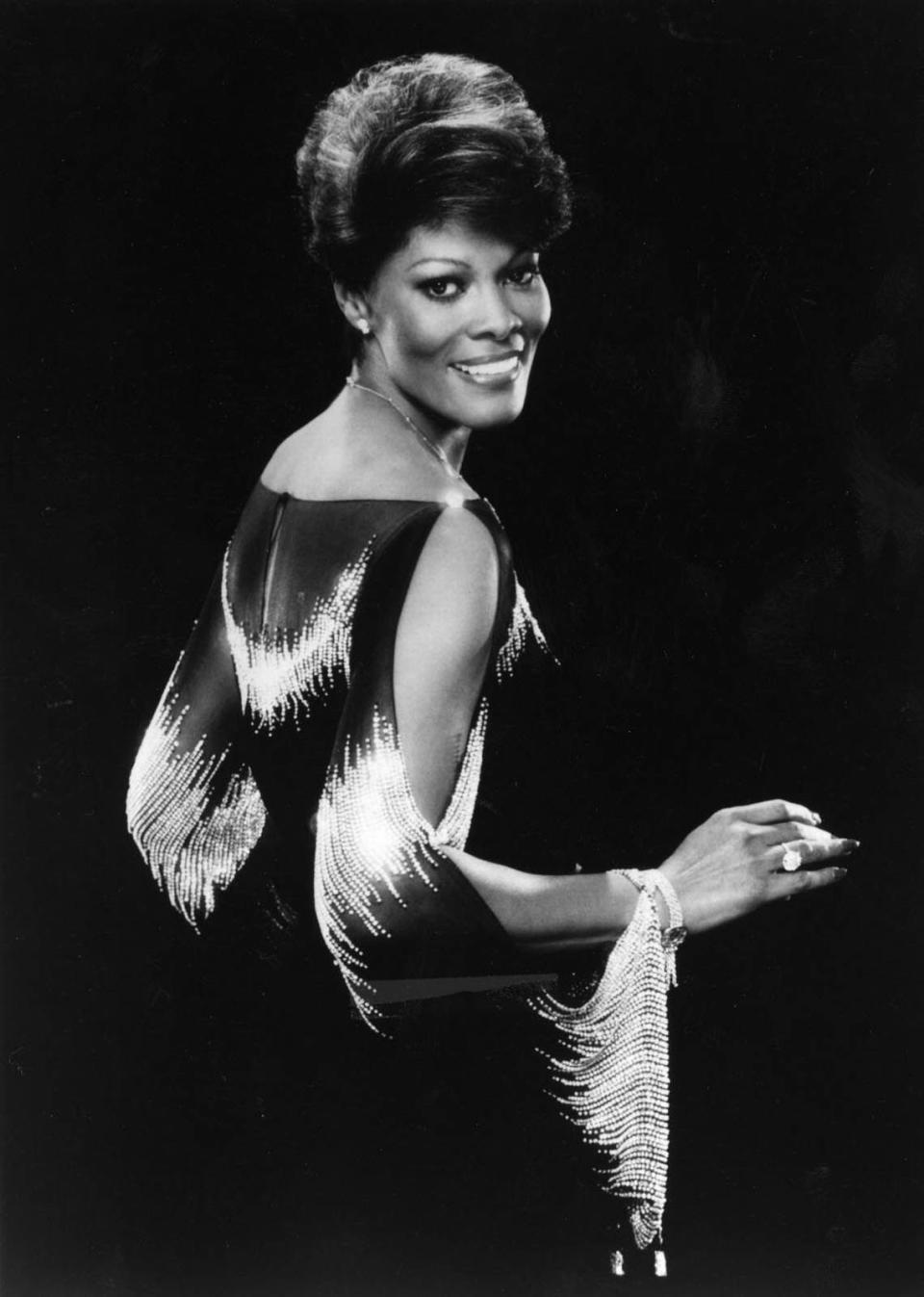Ahead of her Kansas City honor, Dionne Warwick talks about Bacharach, music and ‘duty’
- Oops!Something went wrong.Please try again later.
- Oops!Something went wrong.Please try again later.
In December, Dionne Warwick will receive a prestigious Kennedy Center Honor for lifetime achievement in the arts.
Finally.
“That’s what everyone said,” Warwick laughed over the phone with The Star last week.
But before that glitzy affair in the nation’s capital, she has another honor to collect. The six-time Grammy winner will be in Kansas City this weekend to be inducted into the American Jazz Walk of Fame.
Her fellow inductee will be the composer who famously wrote the music for many of her hits — Kansas City native Burt Bacharach, who died in February at age 94.
“I think it’s lovely that they’re going to posthumously recognize the work that we did together,” Warwick said.
Their names will be inscribed on 30-inch bronze medallions and embedded into the sidewalk along 18th Street, between the Blue Room and the American Jazz Museum in the 18th and Vine District.
The medallions will be unveiled during a brief ceremony at 6 p.m. Saturday. It is free and open to the public.
Starting with “Don’t Make Me Over” in 1962, Warwick, Bacharach and the late lyricist Hal David created a songbook of iconic American pop songs.
“What the World Needs Now.”
“Walk on By.”
“Do You Know the Way to San Jose?”
“I Say a Little Prayer.”
“I’ll Never Fall in Love Again.”
Warwick won’t be asked to sing at the event, but at 82 she still performs. In recent years she has become a pop culture icon to a new generation.

TV, a movie and Twitter
The Twitterverse crowned her “Queen of Twitter” when she joined the social media platform and let fly her sassy flag and unfettered commentaries — sometimes about other celebrities.
Adoring Twitter followers — there are more than 600,000 now — call her “Auntie.” (Fitting, because one of her nieces set her up on Twitter.)
“I am everyone’s Auntie,” Warwick tweeted to ring in 2021.
“Saturday Night Live” honored Warwick on her 80th birthday in 2020 with a sketch featuring cast member Ego Nwodim portraying the singer as the host of the “Dionne Warwick Talk Show.”
Warwick later surprised viewers by showing up as herself in one of the recurring sketches.
“Dionne, why are you perfect?” Nwodim asked the music legend.
“My darling I’m not perfect, I’m just very, very good,” Warwick replied.
Hi @dionnewarwick pic.twitter.com/iHqdDta3d4
— Saturday Night Live - SNL (@nbcsnl) November 7, 2021
The documentary “Dionne Warwick: Don’t Make Me Over” debuted in January, chronicling her career and personal life, a story that begins with her singing for the first time in public in her minister-grandfather’s church.
She was 6, standing on a stack of books to reach the mic, so nervous that she kept her eyes closed as she sang the Christian hymn “Jesus Loves Me.”
Talking about the film on “The Jennifer Hudson Show,” Warwick said people are always “surmising” and assuming they know things about her.
“Now,” she told Hudson, “you know.”
The film is streaming on Max.
When Warwick and Bacharach were chosen months ago for the Walk of Fame honor, organizers had expected both to attend.
When Bacharach died earlier this year, Warwick was one of the first people the media wanted to hear from.
“Burt’s transition is like losing a family member,” Warwick said in a statement when Bacharach died. “These words I’ve been asked to write are being written with sadness over the loss of my Dear Friend and my Musical Partner.
“On the lighter side we laughed a lot and had our run ins but always found a way to let each other know our family like roots were the most important part of our relationship.”

Kansas City’s Walk of Fame
Her placement on the Jazz Walk of Fame reflects Warwick’s ability to straddle musical genres.
The honor is given by the nonprofit Jazz District Renaissance Corp., whose mission is “to enhance and grow the district’s reputation as a hotbed for art and music,” said Suzetta Parks Pennington, who is producing Saturday’s event.
Democratic Rep. Emanuel Cleaver, a corporation board member, suggested creating a walk of fame in Kansas City, said Parks Pennington.
The first medallions were installed in 2014 to “acknowledge and reward and celebrate all the great artists who have come through Kansas City, either honed their craft and moved on, or and the local musicians whose works have been underappreciated,” Parks Pennington said.
Past honorees include Louis Armstrong, Quincy Jones, Harry Belafonte, Charlie Parker Jr. and Ella Fitzgerald. Bacharach often credited the influence of jazz icon Parker, a fellow Kansas Citian.
Some people might question “whether Dionne is into jazz,” Parks Pennington said. “But their music has crossed so many genres … traversed through pop, R&B, jazz, easy listening.
“The Walk of Fame recognizes that jazz is the core of a lot of musical styles and it’s because of that that we appreciate and celebrate all genres of music.
“So we felt that both Burt and Dionne’s music reflected the position we have that jazz fits into the evolution of music in this country.”
As a crossover artist, Warwick took joy in how her music couldn’t be categorized, telling a New York Times writer earlier this year that “I continue to preach the fact that music is music.”

Her name wasn’t Warwick
Warwick, by the way, was not her surname. The family name is Warrick. But in 1962 when she released her first single, her surname was misspelled “Warwick” on the record label and she kept it.
She was born in East Orange, New Jersey, into a religious family full of singers. When she was 14 she and her sister and cousin formed The Gospelaires. They grabbed big attention when they won an amateur contest at Harlem’s famous Apollo Theater.
That faith-based influence stayed with her throughout her career, Warwick said. Earlier this year she and country star Dolly Parton released a gospel duet, “Peace Like a River.”
“It was what I grew up around, gospel,” she told The Star. “Gospel music has literally helped me understand words, what they mean. Melodies are important. However, when you sing words to people that are meaningful and inspirational, that’s what gospel is.”
She was a backup singer when Bacharach first heard her voice, which music critics have called “singular,” “flawless” and “pure.”
For a decade, most Bacharach-David hits were written for and performed by Warwick.
“It was a case of all the right people in the right place at the right time,” Bacharach told the Chicago Tribune in 1987. “Hal and I found the perfect partnership, and Dionne was the perfect voice for our songs.”
Perhaps that connection was meant to be.
Bacharach was born in Kansas City on May 12, 1928. His family moved to New York in 1932.
In November 2014, before he played at the Kauffman Center for the Performing Arts, Bacharach visited his onetime family home here — on Warwick Boulevard.
“How is that for an odd coincidence, since many of these songs were sung by Dionne Warwick?” he asked his audience.
Warwick told the Star that even though Bacharach’s arrangements were known for being tricky for singers, she “didn’t find his music difficult, though they were very intricately composed.”
“I’ve always said he marched to his own drummer,” she said. “It was like taking a music exam each time you went into the studio with him.”
After the induction ceremony Saturday, a concert in the Gem Theater will feature singers Will Downing and Avery Sunshine, but tickets sold out last week.
They’ll be singing Warwick songs, Parks Pennington said. But if the singers did their homework, they’ won’t sing “Do You Know The Way to San Jose.”
Though it is one of her most famous songs, Warwick isn’t really a fan.
As she has suggested in interviews and in the documentary, she thought Hal David — whom she called a poet, never a lyricist — could have done better than write “wo, wo, wo, wo, wo, wo, wo, wo, wo, wo.”
Elizabeth Taylor’s request
Also in the documentary, Elton John praises his friend Warwick for being one of the first in the music industry to publicly support AIDS victims during the nation’s epidemic in the 1980s.
Warwick, John, Gladys Knight and Stevie Wonder famously recorded the song “That’s What Friends Are For” to raise money for AIDS research.
Warwick told the Star that the first time she heard the song — written by Bacharach and Carole Bayer Sager — Rod Stewart was singing it in the movie “Night Shift.” She was watching it late one night and even before the credits rolled, she recognized it as a Bacharach tune.
She mentioned the song the next time she was in the recording studio with Bacharach and Bayer Sager.
“Now four people know that song. Burt, me, Rod Stewart and now you,” Bayer Sager told her.
“Now let’s add the world,” Warwick responded. She wanted to sing it.
She said Elizabeth Taylor was in the control room as she and her three superstar friends recorded the song.
“Once we finished the recording she approached us and let us know she had just started AMFAR,” Warwick told The Star, referencing the American Foundation for AIDS Research, known today as the Foundation for AIDS Research.
“And what a wonderful song it would be to give people hope and joy if it were used to combat and make people aware of the AIDS problem.”
Because she and John and the others had “all in one way or the other felt the sting of AIDS,” losing friends and colleagues to the disease, they basically gave the song to Taylor.
“Every dime from that particular song to this very day still goes to AMFAR,” Warwick said.
One scene in the documentary shows Warwick visiting the foundation’s headquarters in New York City, receiving a surprise hero’s welcome from the staff.
That song has raised millions of dollars for the cause, money that could have made Warwick a very wealthy woman by now, one foundation official teased her.
But Warwick brushes aside such thoughts.
“They called it a sacrifice,” she told The Star. “I called it a duty.
“From a very young age, my grandfather said we are all put here on this earth to be of service to others.”

